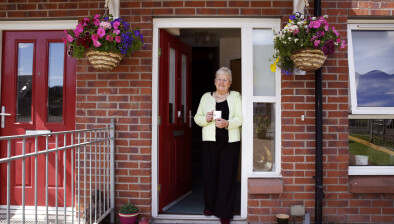WSHA backs calls for governmental action to address ‘devastating’ effect of cost-of-living crisis on social housing tenants

Chief executive Brian Gannon speaks to a WSHA tenant at a recent tenant event
The voices and experiences of West of Scotland Housing Association (WSHA) tenants were presented to the UK Government this week as part of a new report by the Scottish Federation of Housing Associations (SFHA) outlining the devastating impact the cost-of-living crisis has had on social housing tenants across the country.
A key evidence base for the report findings was a survey undertaken by WSHA early in 2023, which gathered tenants’ views and experiences of the ongoing cost-of-living crisis, and their ideas around what support would be beneficial to them. The survey received the highest response rate of any survey undertaken by WSHA, with 748 respondents from households around Glasgow, Ayrshire and Lanarkshire.
The WSHA survey reported 86% of tenants feeling worse off than they did in the previous year, with the majority identifying soaring energy costs (98% of tenants) and food costs (95% of tenants) as their main source of financial worry. This is a similar figure to that reported by the Scottish Housing Regulator’s national panel of tenants and service users, which identified 76% of tenants as feeling they are worse off now than at the same point in 2022.
These key findings were echoed across the sector and included in the SFHA’s report as it went in front of the House of Commons on Wednesday.
Since receiving the results of the survey, WSHA has implemented a cost-of-living crisis action plan in direct response to tenants’ identified needs. This has resulted in real, on-the-ground action, including: putting in place a free, 24/7 Tenant Support and Wellbeing service; receiving additional funding to supply fuel vouchers to tenants and employing additional energy and money advice staff at the Association’s charitable arm, Willowacre Trust, to help meet demand from tenants.
However, as outlined in the SFHA report, it is action on a governmental level that will facilitate the changes needed to avert long-term disadvantage for social housing tenants.
Brian Gannon, chief executive officer of WSHA, said: “WSHA has always been more than a landlord. Its founders were keen to ensure they didn’t just provide a home for tenants, but that they supported those that needed help to live in their homes. Our mission has not changed.
“With over half of our survey respondents reporting the cost-of-living crisis having a negative impact on both their physical and mental health, our action plan has been essential to help our organisation do what we can to mitigate the worst of this situation for our tenants. But we can’t solve this crisis alone, and we stand fully behind SFHA’s call for further and immediate governmental action.”
As the cost-of-living crisis continues, West of Scotland’s team will be continuing to work to support tenants in both the immediate and longer term. Immediate support includes working alongside Smart Energy GB to get Smart Meters fitted in more homes, issuing energy-saving air fryers in our starter packs and continuing on-the-ground provision of Willowacre Trust’s robust support services including personalised, free energy and money advice, access to our digital device lending library, and upcycling and handyperson services.
Longer-term actions include reviewing our asset management strategy to prioritise investment which helps reduce energy use and reviewing our service charges to ensure affordability and value for money for tenants.







